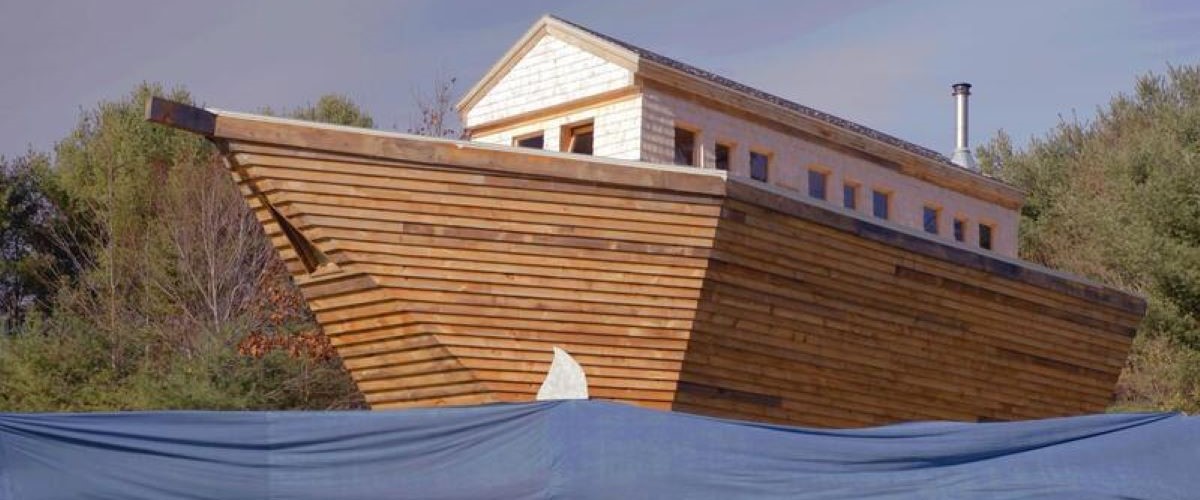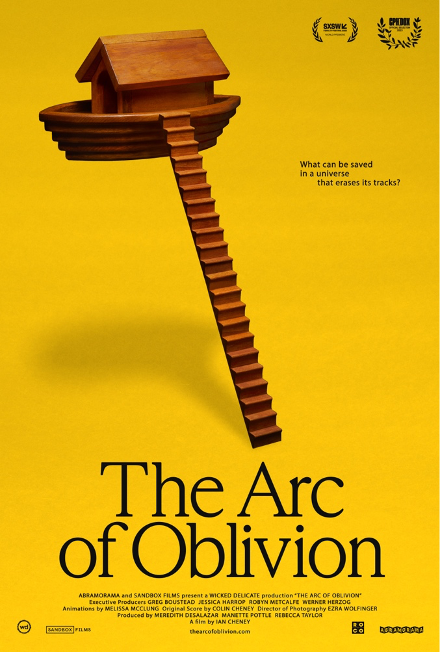“The Arc of Oblivion” is a documentary about a lot of things, including the futility of its own existence. Writer-director Ian Cheney, who also narrates, presents himself as, basically, a hoarder, mainly of hard drives containing photos, video and audio of various things in his life, some of them undeniably important and others that fall under the heading of “curiosities” (including a framed photo of a man described as “the world’s greatest barber” cutting another man’s hair). Cheney also has material collected by others and either acquired or passed into his possession, such as a photo slide box kept for decades by his father, who wrote the words “The Ark” on the side. When Cheney finally opens it, it contains a shot of his mother sitting on a rock and two shots of red wine glasses in front of a pumpkin, and it’s impossible to know why it was considered important enough to save.
The title is a pun that can be appreciated on multiple levels. The framework for the movie is Cheney’s quest to construct an actual ark (small “k” on the end) like the ones in the Old Testament or the Epic of Gilgamesh on family property in the woods of Maine, in order to contain all of the stuff he wants preserved. The building of this vessel an attempt to superimpose form and limits (or boundaries) on a mountain of random ephemera and data that he’s gathered up during the course of many decades, as well as a self-deprecatingly humorous lashing-out against the concept of impermanence (as if sticking all of his stuff in a boat on dry land isn’t actually going to preserve it!). Building an ark is also a somewhat arbitrary and cool (verging on gimmicky — and Cheney realizes this) way to superimpose limits on the 98-minute movie you’re watching. “The Arc of Oblivion” could just as easily have been nine or nine-hundred minutes long, considering what it’s about. And the “c” in the word “arc” confirms that this is all ultimately pointless, even though we can fantasize otherwise. Or as Bruce Springsteen sang in “Atlantic City,” “Everything dies, baby, that’s a fact/But maybe everything that dies someday comes back.”
Documentarian Kristen Johnson (“Cameraperson,” “Dick Johnson is Dead”), whose own work has similar fascinations, appears in the film along with her brother Kirk Johnson, a paleontologist and fossil collector who tells the filmmaker that he wants to be buried in the Mississippi River because spots like that are where fossils are most likely to be formed, and he wants to be remembered somehow, even if it’s only by the land itself. We also meet potter Yasmin Glinton Poitier, who lost her childhood house in a hurricane, and limestone magnate and Christian David Hoch, who does a quality check on the concrete being used in the ark’s foundation, then does a little presentation about limestone and its use in the so-called magic lantern, which is where the phrase “in the limelight” comes from; and married photographers Erin and Brian Palmer, who shoot cemeteries where the remains of Black Americans are interred. The score is by the director’s brother Colin Cheney, who mixed the family’s audio and video with recordings of sounds that he made from interacting with objects his father stored in the family’s barn.
The great German ruminator Werner Herzog didn’t have much to do with “Arc of Oblivion” beyond executive producing it, but his spirit infuses the entire thing, including Cheney’s narration, which has that Herzogian quality of disappearing into its own navel almost immediately and being entertaining and funny anyway because it’s simultaneously self-mocking and sincere. There’s also a buried (like, deep beneath the creative soil) acknowledgment of Herzog’s own filmography, which is packed with stories about men who went on a mad quest to erect a monument to their own existence only to find out the hard way that it’s a pointless exercise.
It would be interesting to show this film as part of a triple feature with Herzog’s “Fitzcarraldo,” about a rubber baron obsessively trying to get a steamship over a hill in the Peruvian jungle, and “The Burden of Dreams,” Les Blank’s documentary about the making of “Fitzcarraldo.” What Cheney is doing here is the self-effacing 21st century American bourgeois artist equivalent of what a Herzog hero would do when confronted with the inescapable fact that he and everyone else he knows or has ever heard of will eventually die, and that the civilization they were part of will fade, too, until only a fossil record remains.
This is a thoroughly stimulating movie. There’s so much going on in it that you don’t get it all the first time, mainly because Cheney and his collaborators have kept things loose and light, with a “no big deal” tone. One could pretty easily mistake it for an intellectualized form of escapism, like listening to a long National Public Radio story about an eccentric. I’m glad that I am writing about it almost a year after seeing it for the first time, during its 2023 South by Southwest film festival premiere. I see the fossil records embedded in the movie clearly now. This film is one for the ages, by which I mean that a few more decades, almost nobody will remember it, or the filmmaker, or me—although I wouldn’t rule out the possibility of my thinking about it on my deathbed.




















